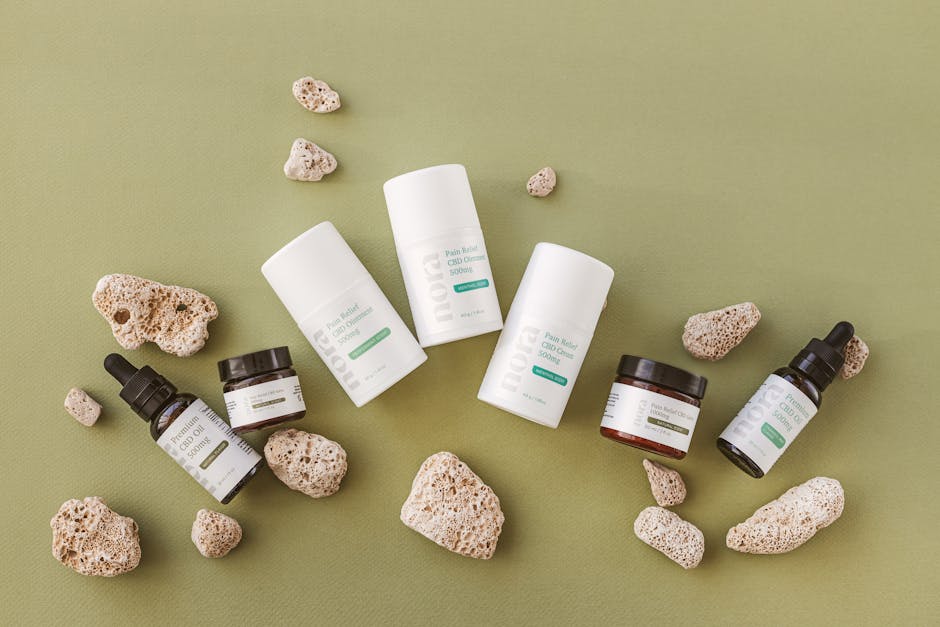Why Natural Skincare Benefits Are Revolutionizing Beauty
Natural skincare benefits are changing how we approach beauty, offering safer ingredients, environmental sustainability, and proven results for healthier skin. Here’s what makes natural skincare so powerful:
Top Natural Skincare Benefits:
- Gentler on skin – Free from harsh synthetic chemicals that can irritate
- Rich in antioxidants – Plant extracts protect against environmental damage
- Environmentally sustainable – Biodegradable ingredients reduce pollution
- Cruelty-free – No animal testing needed for proven natural ingredients
- Hormone-safe – Avoid endocrine disruptors found in synthetic products
- Supports skin barrier – Natural oils and botanicals work with your skin’s biology
The natural skincare market is projected to reach nearly $8 billion this year, driven by consumers who want transparency and effectiveness without compromise.
But here’s the reality check: natural doesn’t automatically mean safe. Up to 94% of products labeled “all-natural” contain ingredients that can trigger contact dermatitis. The key is understanding which natural ingredients actually work and how to choose products that deliver real results.
Your skin absorbs up to 60% of what you apply to it. That’s why switching to thoughtfully formulated natural products isn’t just about following trends – it’s about making informed choices for your health and the planet.
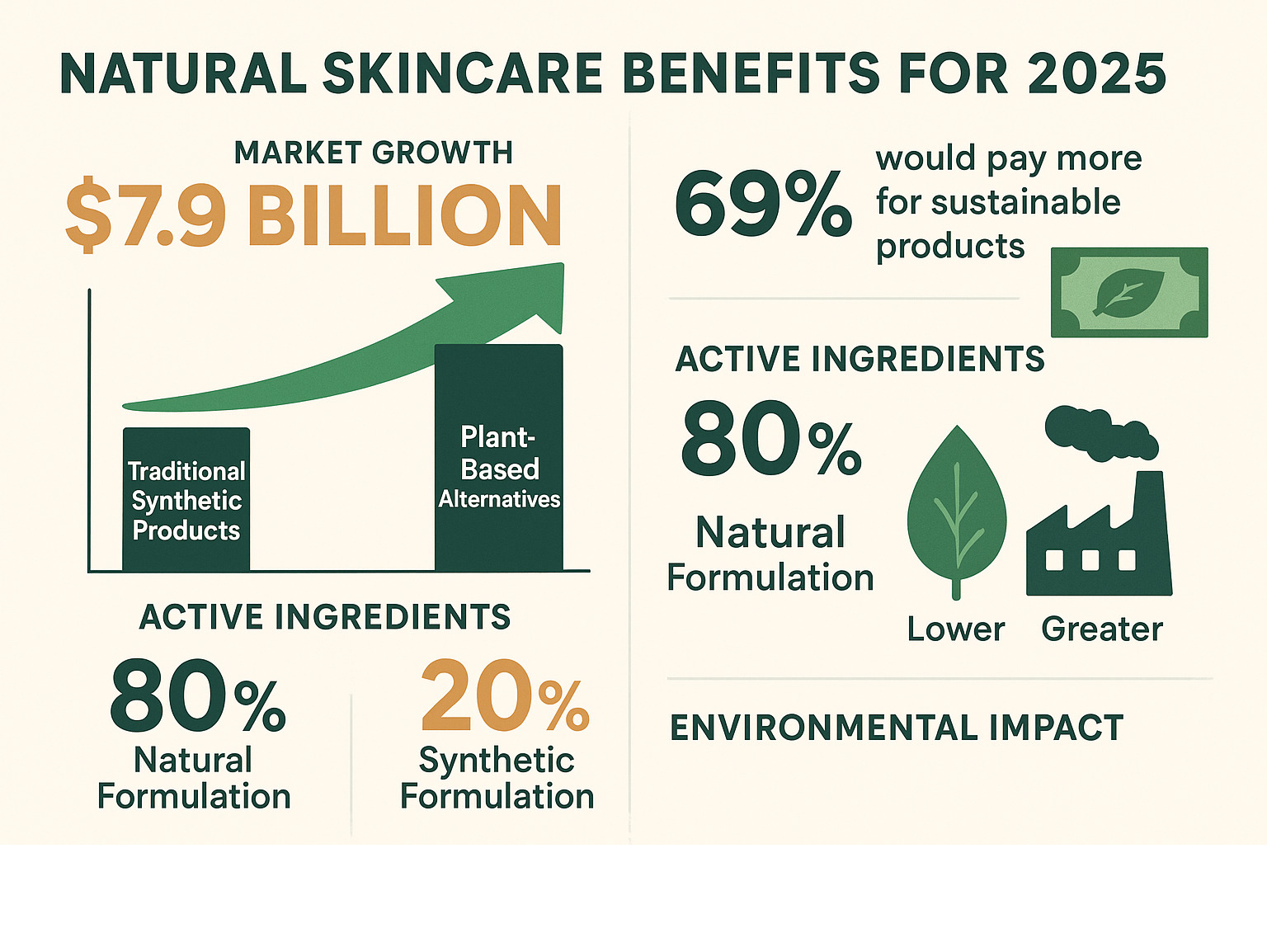
Important natural skincare benefits terms:
Understanding Natural Skincare: Definitions & Standards
Walking down the skincare aisle feels like navigating a maze of buzzwords. “Natural,” “organic,” “clean,” and “green” are splashed across every bottle, but what do they actually mean?
Here’s the surprising truth: the FDA doesn’t regulate the term “natural” in cosmetics at all. That means brands can basically call anything natural – even if it’s mostly synthetic ingredients with a drop of lavender oil.
Natural skincare typically refers to products made from plant-derived ingredients, minerals, and other materials found in nature. But without clear standards, this definition varies wildly from brand to brand.
Organic skincare is where things get more official. The USDA Organic Seal requires at least 95% organic agricultural ingredients, while products labeled “Made with organic” need at least 70%. In the European Union, products must contain at least 95% natural ingredients to earn the natural label under Regulation (EC) No 1223/2009.
Clean beauty focuses on avoiding controversial ingredients like parabens, sulfates, and synthetic fragrances. Meanwhile, green beauty emphasizes environmental sustainability throughout the entire product lifecycle.
| Term | Definition | Regulation Level |
|---|---|---|
| Natural | Plant-derived, mineral ingredients | None (FDA) |
| Organic | 95%+ organic agricultural ingredients | USDA regulated |
| Clean | Avoids controversial chemicals | Brand-defined |
| Green | Environmentally sustainable | Brand-defined |
The key takeaway? Natural skincare benefits are real, but you need to look beyond the marketing claims. Reading ingredient lists becomes your superpower – the first five ingredients make up about 80% of the product.
For more detailed information on cosmetic regulations, check out this Scientific research on cosmetic regulation.
Natural ≠ Automatically Safe: Myth-busting Basics
Let’s bust the biggest myth in natural skincare: natural doesn’t automatically mean safe. Poison ivy is 100% natural, but you definitely don’t want it anywhere near your face.
A 2023 study examined nearly 1,700 products labeled “all-natural” and found something shocking: over 94% contained ingredients known to trigger contact dermatitis.
Common natural troublemakers include essential oils like lavender, tea tree, and citrus oils. Even gentle-sounding botanical extracts like chamomile and calendula can cause reactions in sensitive people.
The term “hypoallergenic” isn’t regulated either – it’s basically marketing speak with no legal meaning.
Here’s your safety game plan: always patch test new products, even natural ones. Apply a small amount behind your ear or on your inner wrist, then wait 24-48 hours and watch for any redness, itching, or irritation.
The bottom line? Natural skincare benefits are absolutely real when you choose the right products for your skin type. But natural ingredients deserve the same respect and caution as any other skincare ingredient.
For detailed information on contact dermatitis risks, see this Scientific research on contact dermatitis.
The Science-Backed Natural Skincare Benefits for Every Skin Type
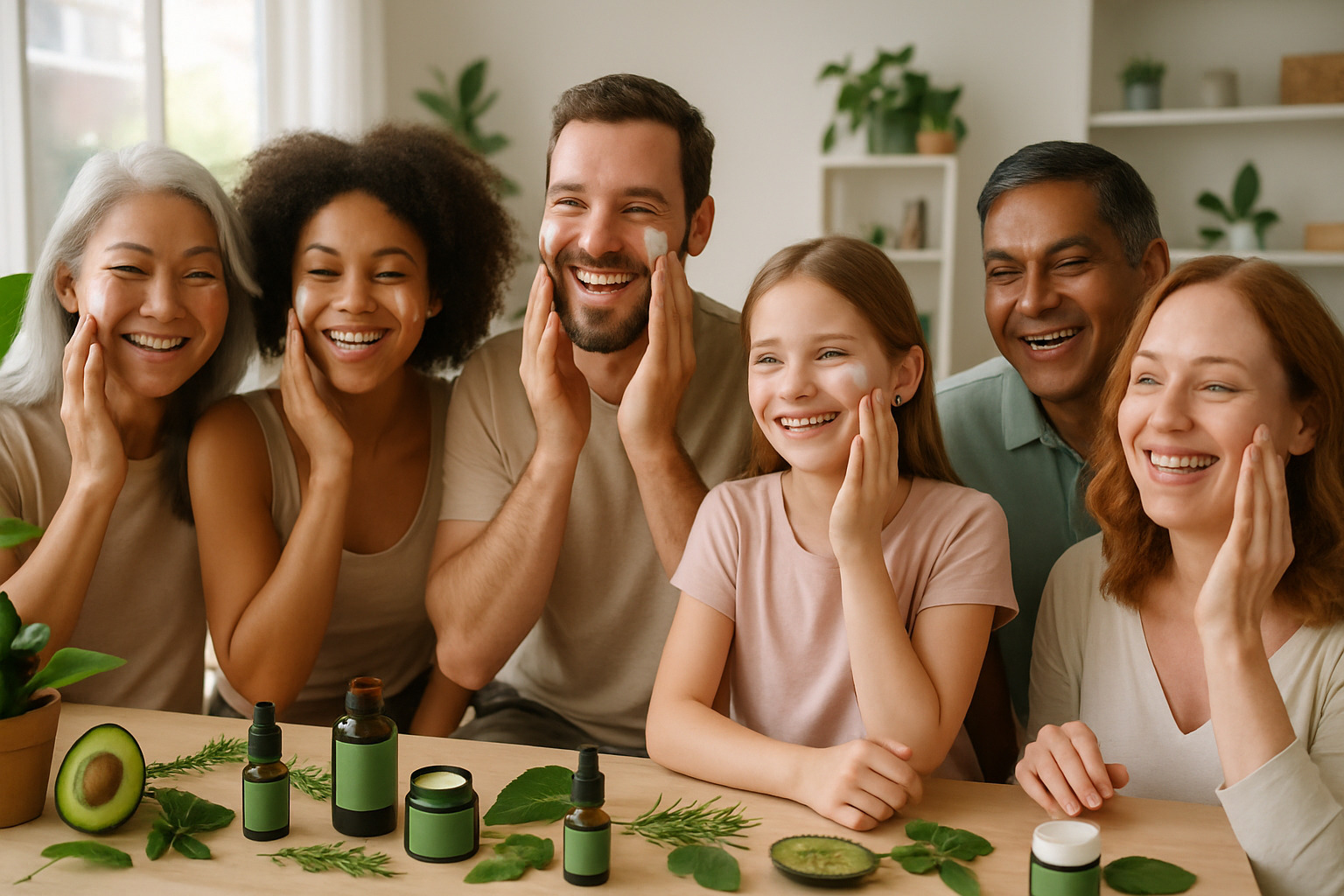
The natural skincare benefits are not just marketing hype – they are backed by real science that shows how plant-based ingredients can transform your skin in ways synthetic alternatives often cannot match.
Think of your skin as a complex ecosystem. When you feed it with bioactive compounds from plants, you are working with your skin’s natural processes instead of against them.
Antioxidant protection is where natural ingredients truly shine. Green tea extract delivers powerful EGCG compounds, while vitamin C from acerola cherry provides more stable protection than its synthetic counterparts.
Your skin’s anti-inflammatory response also benefits tremendously from natural ingredients. Chamomile contains chamazulene, aloe vera offers healing polysaccharides, and turmeric provides curcumin – all compounds that calm irritated skin without potential side effects of synthetic anti-inflammatories.
Microbiome support from natural prebiotics helps maintain your skin’s delicate bacterial balance, while harsh synthetic ingredients can disrupt it entirely.
Barrier strengthening is another area where nature excels. Plant-derived ceramides and natural oils integrate with your skin’s existing lipid structure, helping repair and maintain your protective barrier from the inside out.
Natural Skincare Benefits for Sensitive Skin
If your skin throws tantrums at the slightest provocation, natural skincare benefits can be your saving grace. The secret is not just avoiding harsh ingredients – it is choosing the right gentle powerhouses that actually heal and protect.
Aloe vera is like a cool drink of water for angry skin. Its polysaccharides do not just soothe inflammation; they actively promote healing at the cellular level.
Chamomile brings centuries of gentle healing to modern skincare. The chamazulene compound that gives chamomile its beautiful blue color is also what makes it so effective at calming reactive skin.
Green tea offers antioxidant protection that is particularly gentle for sensitive types. The EGCG compounds provide powerful free radical protection without potential irritation of synthetic antioxidants.
Jojoba oil is technically a wax that perfectly mimics your skin’s natural sebum. This means it absorbs beautifully without clogging pores or causing reactions, even on the most finicky skin.
The key to success with sensitive skin is patience. Start by replacing one product at a time and give your skin at least two weeks to adjust.
For more detailed guidance on choosing the right products for reactive skin, check out our Natural Skincare Solutions.
Environmental & Ethical Natural Skincare Benefits
When you choose natural skincare, you are not just treating your skin – you are casting a vote for the kind of world you want to live in. The natural skincare benefits ripple out far beyond your bathroom mirror.
Every time you wash your face, those ingredients go down the drain and into our water systems. Biodegradable ingredients from plants break down naturally, while synthetic chemicals can persist in the environment for decades.
Lower carbon footprint is another win. Plant-based ingredients require significantly less energy to produce than petroleum-derived synthetics.
Sustainable farming practices that produce natural skincare ingredients also protect soil health and wildlife habitats. Many natural ingredient suppliers use regenerative agriculture techniques that actually improve the land over time.
The ethical advantages are equally compelling. No animal testing is needed for ingredients with centuries of safe human use. Fair trade sourcing ensures that farmers growing your skincare ingredients receive fair compensation.
Research shows that nearly two-thirds of women are willing to pay more for sustainable skincare, with 37% saying that paying more feels like “doing something good for the planet.”
For more tips on building a sustainable beauty routine, explore our Zero Waste Skincare guide.
Powerhouse Natural Ingredients & Their Targeted Benefits
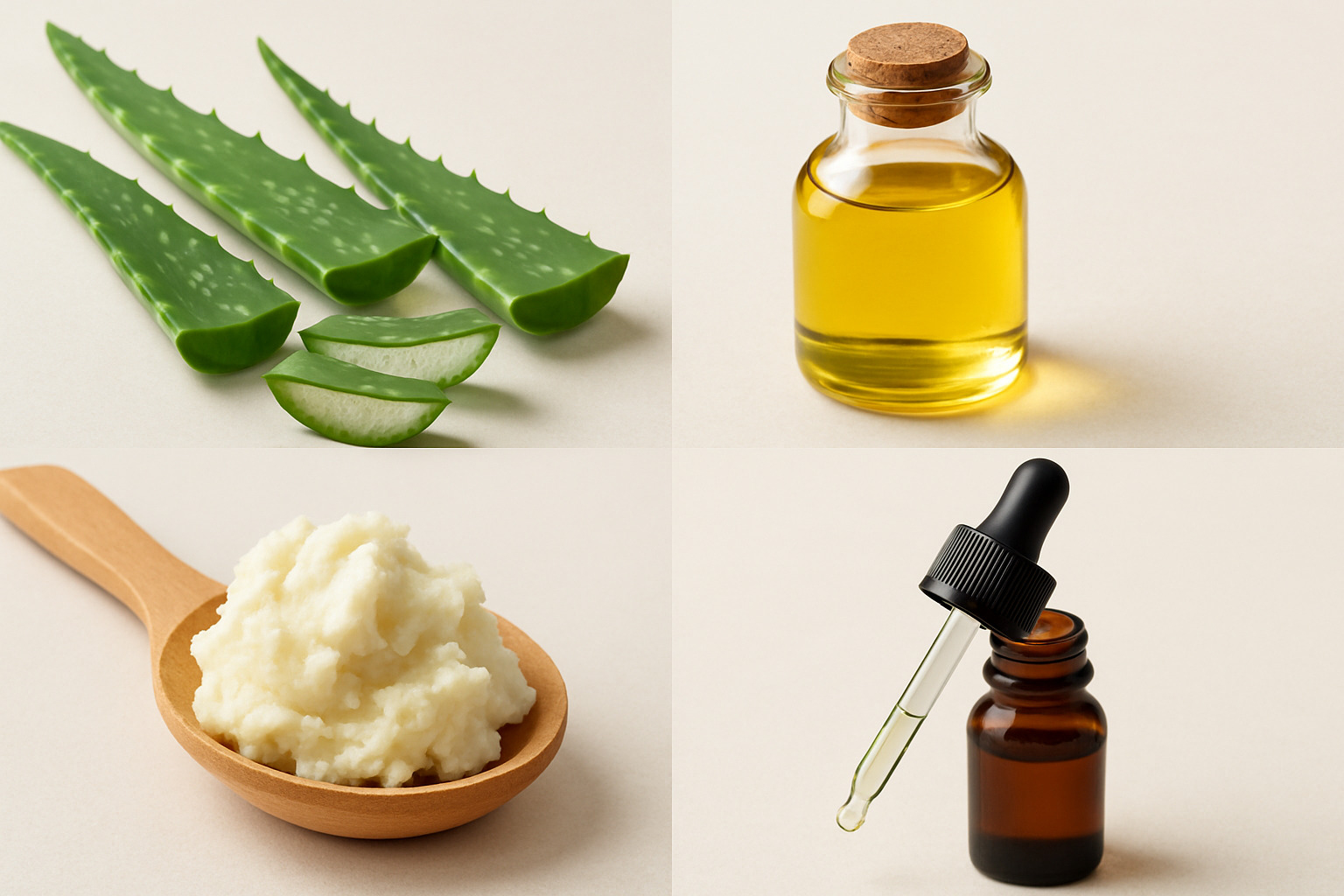
Think of natural skincare ingredients as nature’s pharmacy – each one packed with specific compounds that target your skin’s needs. Unlike synthetic ingredients that often serve just one purpose, these botanical powerhouses deliver multiple natural skincare benefits in every drop.
Jojoba oil is the overachiever of the natural skincare world. Technically a liquid wax, it mimics your skin’s natural sebum so perfectly that it can actually trick oily skin into producing less oil.
Shea butter brings serious anti-aging power to the table. Rich in vitamins A and E, plus inflammation-fighting triterpenes, it’s been used for centuries in Africa for good reason. Modern science confirms what traditional healers knew – shea butter boosts collagen production while soothing irritated skin.
Aloe vera contains over 200 active compounds working together like a perfectly orchestrated skincare symphony. Polysaccharides provide healing and hydration, while natural humectants draw moisture from the air to keep your skin plump.
The real magic happens with green tea extract. Its star compound, EGCG, acts like a protective shield against environmental damage while calming inflammation. It’s particularly brilliant for acne-prone and sensitive skin types.
Honey deserves special mention as nature’s multitasker. This golden ingredient is both a natural humectant and antimicrobial powerhouse, making it perfect for hydrating while keeping breakouts at bay.
Tea tree oil packs serious antimicrobial punch, but here’s the catch – always use it diluted. Pure tea tree oil can irritate even the toughest skin, but when properly formulated, it’s a game-changer for acne.
Rosehip oil and argan oil are the anti-aging heroes, loaded with vitamin C and essential fatty acids that help repair sun damage and boost skin renewal.
Here’s something fascinating: up to 95% of an organic skincare product’s contents are active ingredients, compared to only 5-10% in synthetic products.
Top 10 Natural Skincare Powerhouses:
- Jojoba Oil – balances oil production
- Shea Butter – anti-inflammatory and anti-aging
- Aloe Vera – healing and hydration
- Green Tea Extract – antioxidant protection
- Honey – moisturizing and antimicrobial
- Tea Tree Oil – acne-fighting power
- Rosehip Oil – vitamin C and anti-aging
- Coconut Oil – moisturizing (watch for clogged pores)
- Argan Oil – vitamin E and essential fatty acids
- Chamomile Extract – soothing for sensitive skin
Spotlight: Proven Extracts & Studies
Green tea’s EGCG isn’t just trendy – clinical studies show it genuinely reduces UV damage and calms inflammation. Research specifically highlights its effectiveness for acne and rosacea.
Jojoba oil has been put through rigorous testing, and the results are impressive. Studies demonstrate its unique ability to balance sebum production without clogging pores. This happens because jojoba’s molecular structure is nearly identical to human sebum.
Shea butter’s triterpenes have been shown in research to reduce skin inflammation while boosting collagen production. These compounds work at a cellular level to slow down the aging process.
What makes these ingredients so effective is their complex mix of adaptogens – compounds that help your skin adapt to stress and environmental changes. Unlike single-molecule synthetic ingredients, these natural extracts work synergistically to support your skin’s natural functions.
Choosing & Using Natural Products Wisely
Shopping for natural skincare can feel overwhelming. The secret is knowing what to look for beyond the pretty packaging. Third-party certifications are your best friends here. The USDA Organic seal means at least 95% of agricultural ingredients are certified organic. NATRUE is Europe’s gold standard for natural and organic cosmetics, while Ecocert provides international organic verification.
Here’s something most people do not realize: natural products often have shorter shelf lives than their synthetic cousins. That is actually a good thing – it means they are not loaded with harsh preservatives. Check those batch dates and expiration dates carefully.
Storage matters too. Keep your natural products in cool, dry places away from direct sunlight. That beautiful bathroom windowsill might look Instagram-worthy, but it is slowly cooking your expensive vitamin C serum.
When comparing products, do not just look at the price tag. Compare active ingredient percentages instead. A $30 serum with 20% vitamin C might be a better value than a $60 serum with 5% vitamin C.
DIY natural skincare can be a great way to test ingredients before investing in full-size products. Raw honey makes an excellent hydrating mask when left on for 10-15 minutes. Ground oats mixed with water create a gentle exfoliant that will not irritate sensitive skin.
The key is starting slowly and paying attention to how your skin responds. For more detailed guidance on making smart natural skincare choices, visit our Natural Skincare Tips.
Avoiding Greenwashing & Reading INCI Like a Pro
Let’s talk about greenwashing. It is everywhere in the beauty industry, and it is designed to make you think you are buying something natural when you are really not.
Watch out for sneaky language like “naturally inspired” or “nature-derived.” These phrases sound good but mean absolutely nothing. Beautiful imagery of plants and flowers does not guarantee what is inside the bottle matches the marketing.
Here is a game-changer: the top-five rule. The first five ingredients on any product label make up about 70-80% of the formula. If those first five ingredients are mostly synthetic, then your “natural” product is not really natural.
Learning to read INCI names (International Nomenclature of Cosmetic Ingredients) is like having a secret decoder ring. Aqua simply means water and usually appears first. Botanical names in Latin (like Aloe barbadensis for aloe vera) are typically natural ingredients.
Do not let sticker shock scare you away from quality natural products. Yes, they can be more expensive, but there are good reasons. Higher-quality raw materials cost more to source sustainably. Smaller production batches mean less economy of scale.
Think of it this way: you are paying for active ingredients that actually work, not cheap fillers and synthetic fragrances. A little goes a long way with concentrated natural formulas.
For guidance on building effective routines that will not break the bank, check out our Clean Beauty Routines.
Step-by-Step Guide to Transitioning Your Routine
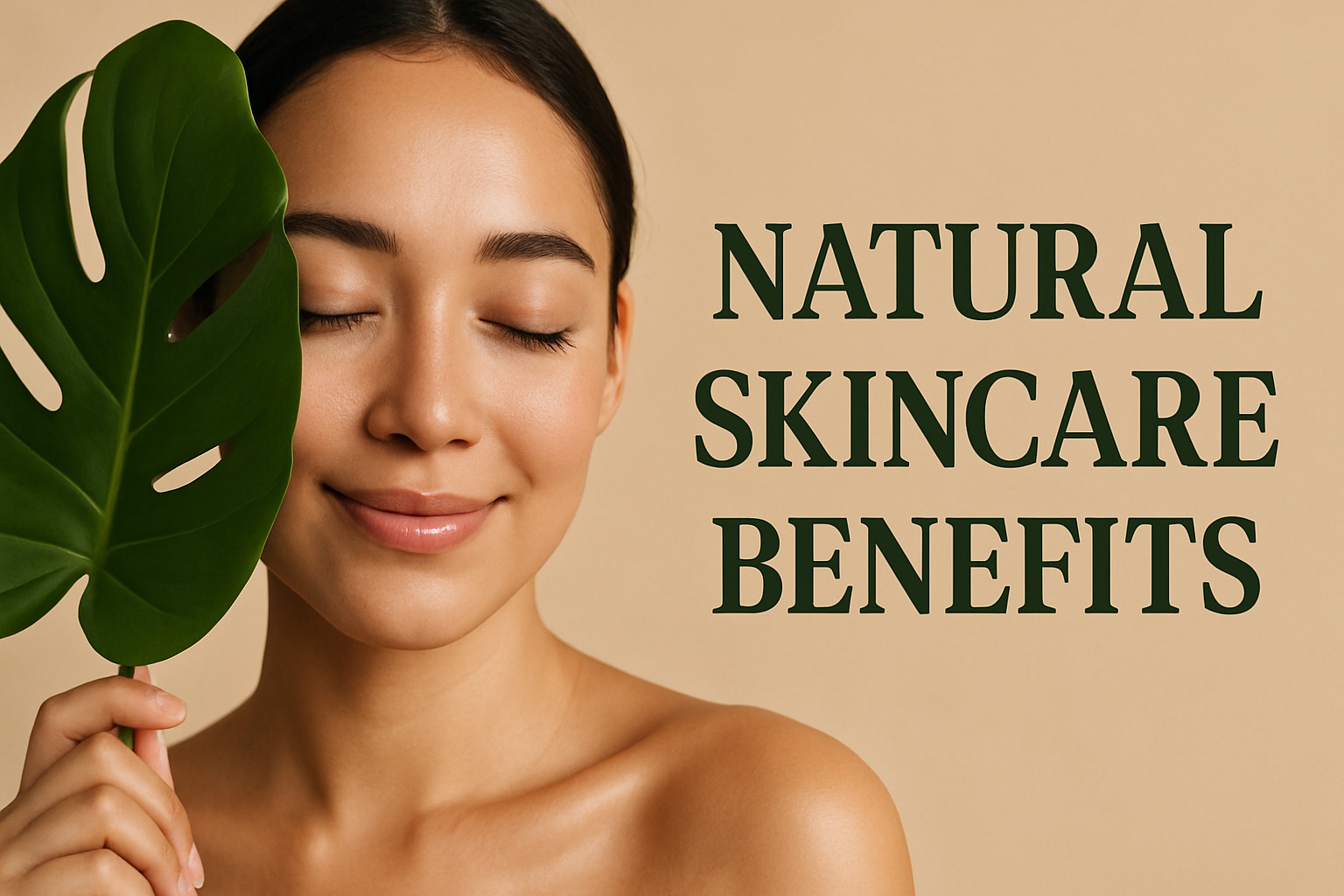
Making the switch to natural skincare does not have to be overwhelming. Think of it like renovating your home – you do not gut everything at once. Instead, you replace things thoughtfully, one room at a time.
Start with your foundation during the first two weeks. Replace your cleanser with something gentle like an oil cleanser made from jojoba or sunflower oil. Next, swap your moisturizer for a natural alternative suited to your skin type. Finally, add a mineral sunscreen with zinc oxide or titanium dioxide for daily protection.
The second phase focuses on treatment products. Introduce a hydrosol toner – these are gentler than alcohol-based toners and provide a lovely botanical boost. Add an antioxidant serum with vitamin C from natural sources like acerola cherry or kakadu plum.
Your daily routine becomes beautifully simple: Morning starts with gentle cleansing, followed by your vitamin C serum, natural moisturizer, and mineral SPF. Evening involves oil cleansing, hydrosol toning, treatment serum, and a rich moisturizer. The natural skincare benefits really shine when you keep things consistent and uncomplicated.
Patch testing is absolutely crucial – and I cannot stress this enough. Apply a small amount of any new product to your inner wrist and wait 24 hours. No reaction? Try behind your ear for another 24 hours. Only then should you apply it to your face.
Budget-wise, replace products as they run out rather than buying everything at once. Start with multi-purpose products like coconut oil, which can cleanse, moisturize, and even remove makeup.
For more detailed guidance on creating your perfect routine, check out our Best Natural Skincare Routine for Glowing Skin.
Budget & Accessibility: Are Natural Products Worth It?
Let’s have an honest conversation about money. Yes, natural skincare can make your wallet feel lighter upfront, but there is more to the story than sticker shock.
Natural products cost more because you are getting better ingredients. While synthetic products might contain only 5-10% active ingredients, natural products often pack in 95% active compounds. You are paying for concentrated plant extracts, sustainable sourcing, and fair trade practices.
The long-term value is where natural skincare really shines. You will likely need fewer products because each one works harder. That expensive rosehip oil? It is doing the job of three synthetic products – serum, moisturizer, and anti-aging treatment rolled into one.
Making natural skincare affordable starts with smart shopping. Begin with the basics – cleanser, moisturizer, and sunscreen. DIY treatments using kitchen ingredients can replace expensive masks and scrubs. Raw honey makes an incredible hydrating mask, and ground oats create the gentlest exfoliator you will ever use.
Shelf life is the trade-off you will need to accept. Natural products typically last 6-12 months compared to 2-3 years for synthetic versions. But think about it – would you rather eat fresh fruit or fruit that has been sitting in preservatives for three years?
The price range varies wildly in natural skincare. You can spend $10 on a bottle of pure jojoba oil that lasts months, or $100 on a luxury botanical serum. Start simple, see what your skin loves, then invest in higher-end products for specific concerns.
DIY alternatives can bridge the gap while you figure out your preferences. Coconut oil works as a makeup remover, aloe vera gel soothes irritation, and green tea makes an excellent toner.
Frequently Asked Questions about Natural Skincare
Are natural products always safer than synthetic ones?
Here is the honest truth: natural does not automatically mean safer. While many natural ingredients are gentler on your skin, they can still trigger allergic reactions or cause irritation just like their synthetic counterparts.
Think about it this way – poison ivy is completely natural, but you definitely do not want it anywhere near your face! The same goes for essential oils like tea tree or lavender, which can cause contact dermatitis in sensitive individuals.
The real secret to safety lies in understanding your skin’s unique sensitivities and choosing products formulated specifically for your needs. Whether an ingredient comes from a lab or a garden, your skin will react based on its individual chemistry.
Always patch test new products – even the most natural, organic cream can cause problems if you are allergic to one of its botanical ingredients. “Natural” does not mean “risk-free,” but it often means fewer harsh chemicals that can disrupt your skin’s natural balance.
Can natural skincare treat acne and aging simultaneously?
This is one of the most exciting natural skincare benefits – many plant-based ingredients are incredible multitaskers! Unlike synthetic products that often target just one concern, natural ingredients frequently address multiple skin issues at once.
Green tea extract is a perfect example. Its EGCG compounds provide powerful antioxidant protection against aging while simultaneously reducing the inflammation that causes acne breakouts. It is like getting two treatments in one bottle.
Jojoba oil works similarly smart. It balances your skin’s natural oil production (helping prevent clogged pores and breakouts) while providing essential moisture that keeps skin plump and youthful-looking.
Raw honey brings antibacterial properties to fight acne-causing bacteria while acting as a natural humectant to draw moisture into your skin. This dual action helps clear breakouts while preventing the dryness that can accelerate aging.
The key is choosing ingredients that complement each other rather than competing for your skin’s attention. Natural formulations often work synergistically, meaning the whole product is more effective than the sum of its parts.
What certifications guarantee a product is truly natural?
When you are shopping for natural skincare, certain certifications can help you cut through the marketing noise and find products that deliver real natural skincare benefits.
USDA Organic certification is your gold standard – it guarantees that at least 95% of the ingredients come from organic agricultural sources. This means no synthetic pesticides, herbicides, or genetically modified organisms touched those plants.
NATRUE certification follows strict European standards for natural and organic cosmetics. They have different levels, from “natural cosmetics” to “natural cosmetics with organic portion” to “organic cosmetics.”
Ecocert and Cosmos certifications are internationally recognized standards that verify both the natural origin of ingredients and environmentally responsible production methods.
However, here is something important to remember: certification costs money. Some excellent small-batch brands create truly natural products but cannot afford the certification process. In these cases, you will need to do a bit of detective work.
Read ingredient lists carefully, research the brand’s sourcing practices, and look for transparency in their manufacturing process. A truly natural brand will be proud to share where their ingredients come from and how they are processed.
Do not let the absence of certification automatically disqualify a product – sometimes the most innovative and effective natural skincare comes from passionate formulators who prioritize quality over marketing badges.
Conclusion

Your journey into natural skincare benefits does not have to be overwhelming. Think of it as becoming friends with your skin – learning what it loves, what it needs, and how to give it the best care possible.
The science is clear: natural ingredients are not just gentle alternatives, they are often more effective than their synthetic counterparts. When you choose products with 95% active ingredients instead of the typical 5-10% found in conventional skincare, you are investing in real results, not just pretty packaging.
Your skin health and planet care go hand in hand. Every time you choose biodegradable ingredients over petroleum-derived chemicals, you are voting for cleaner waterways. When you pick reef-safe formulations, you are protecting coral ecosystems. These choices add up to something bigger than just your skincare routine.
The ethical choice aspect matters too. Supporting brands that source ingredients fairly, avoid animal testing, and use sustainable practices means your beauty routine aligns with your values. It feels good to know that your glowing skin is not coming at someone else’s expense.
Natural does not mean throwing caution to the wind. Patch testing is still your best friend, and reading those ingredient lists will become second nature. Start slow, listen to your skin, and do not be afraid to adjust your routine as you learn what works.
The $8 billion natural skincare market is not just a trend – it is a movement toward transparency, effectiveness, and responsibility. You are part of that change, and your skin (plus the planet) will thank you for it.
Beyond Beauty Lab has plenty more resources to guide you, including our comprehensive Natural Beauty Remedies collection. Your natural skincare journey is just beginning, and we are here to help every step of the way.

